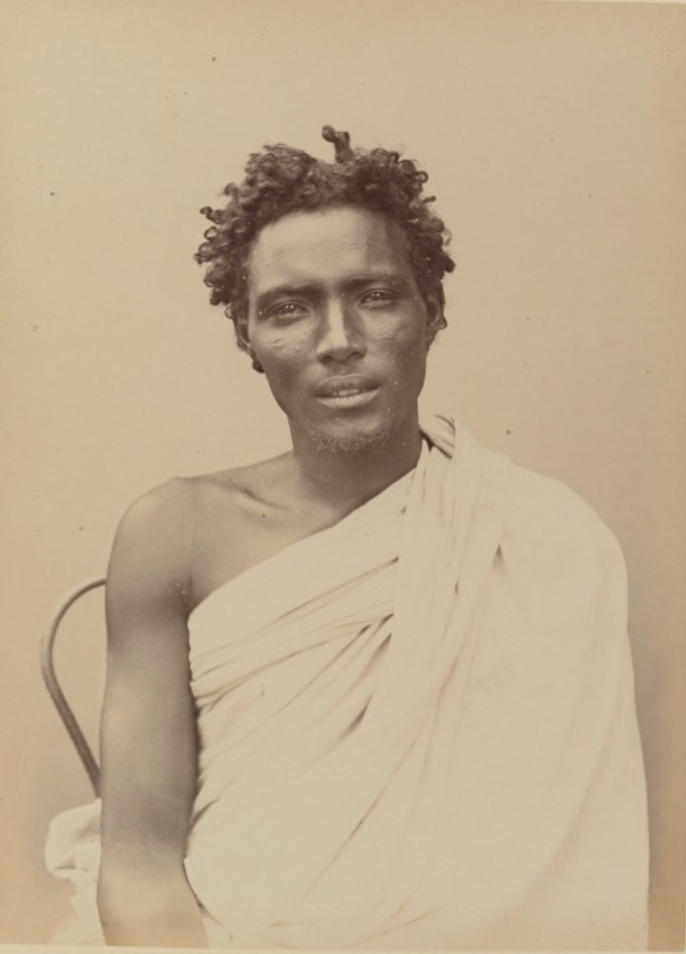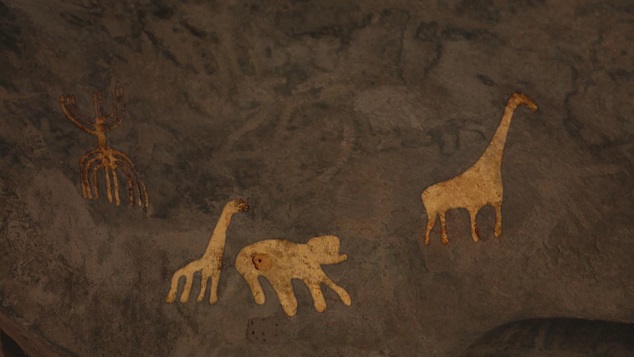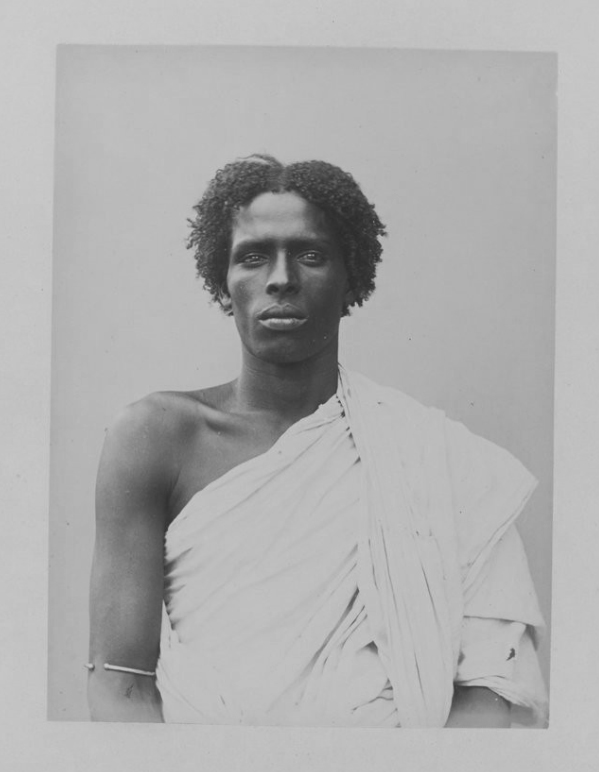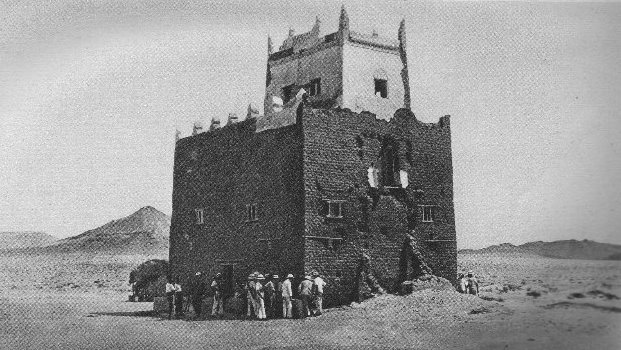|
Madhiban
The Madhiban (Somali: Madhibaan, Arabic:مطيبان, also spelled ماديبان, Madeban, Madebaan, or Madebban) alternately known as Reer Sheikh Madhibe or Mohammed Gorgaarte, are a prominent Somali sub-clan of the Gorgaarte, which belongs to the Hawiye conglomerate of clans. They are scattered throughout the Horn of Africa, with the majority residing in the northern part of Somalia (Somaliland and Puntland) and Ethiopia. The Madhibaan traditionally consist of hunters, artisans skilled in ironworking, producers of goods such as weapons, leather products, textiles, and silver ornaments, traditional surgeons and doctors, and farmers. They were also nomadic and engaged in trade. Their influence extends across the Horn of Africa, reflecting their significant impact on Somali society and the broader region's economic and cultural landscape. Etymology The name "Madhibaan" is believed to come from the forefather of the Madhibaan people, Sheikh Madhibe, who was known for his peaceful ... [...More Info...] [...Related Items...] OR: [Wikipedia] [Google] [Baidu] |
Yibir
The Yibir, also referred to as the Yibbir, the Yebir, or the Yibro, are a caste of Somali people. They have traditionally been endogamous. Their hereditary occupations have been magic making, leather work, the dispensing of traditional medicine and the making of amulets. They belong to the Sab clan and sometimes referred to as a minority clan, they perform menial tasks. The Somali tradition holds that the Yibir are descendants of Mohammad Hanif of Hargeysa. Mohammad Hanif acquired a reputation as a pagan magician, according to Somali folklore, he was defeated by Yusuf bin Ahmad al-Kawneyn. According to this myth, the rest of the Somali society has ever since paid a small gift to a Yibir after childbirth, as a form of blood compensation. The Yibir have a language (a dialect of Somali) they keep secret from the ruling Somali clans. Although Muslims and ethnically similar to other Somalis, the Yibir caste has been traditionally denigrated, demeaned and discriminated against by ... [...More Info...] [...Related Items...] OR: [Wikipedia] [Google] [Baidu] |
Somaliland
Somaliland, officially the Republic of Somaliland, is an List of states with limited recognition, unrecognised country in the Horn of Africa. It is located in the southern coast of the Gulf of Aden and bordered by Djibouti to the northwest, Ethiopia to the south and west, and Somalia to the east. Its claimed territory has an area of , with approximately 6.2 million people as of 2024. The capital and largest city is Hargeisa. Various Somali Muslim kingdoms were established in the area during the early Islamic period, including in the 14th to 15th centuries the Zeila-based Adal Sultanate. In the early modern period, successor states to the Adal Sultanate emerged, including the Isaaq Sultanate which was established in the middle of the 18th century. In the late 19th century, the United Kingdom signed agreements with various clans in the area, establishing the British Somaliland, Somaliland Protectorate, which was formally granted independence by the United Kingdom as the Sta ... [...More Info...] [...Related Items...] OR: [Wikipedia] [Google] [Baidu] |
Islamic Courts Union
The Islamic Courts Union () was a legal and political organization founded by Mogadishu-based Sharia courts during the early 2000s to combat the lawlessness stemming from the Somali Civil War. By mid-to-late 2006, the Islamic Courts had expanded their influence to become the '' de facto'' government in most of southern and central Somalia, succeeding in creating the first semblance of a state since 1991. Following the collapse of the Somali Democratic Republic in early 1991, a new phenomenon emerged – the establishment of Sharia courts to impose law and order on the volatile neighborhoods of Mogadishu. These independent courts found their existence threatened by warlords, necessitating cooperation which resulted in their unification by 2000. The Islamic Courts Union (ICU) was a broad-based organization comprising various courts with diverse goals, from national political ambitions to local dispute resolution and propagation of Islam. Due to Islam's central role in Somali socie ... [...More Info...] [...Related Items...] OR: [Wikipedia] [Google] [Baidu] |
Tumaal
The Tomal, also known as Tumal or Tumaal, is an artisanal among Somali people. Their traditional hereditary occupation has been as smiths and leather production, and they have been endogamous. The Tomal have been one of the low status castes or outcasts among the Somalis, along with Madhiban and others. They have historically faced discrimination, restrictions, harassment and prejudice from other social strata of the Somali people., Quote: "In addition to the Bantus, there are Somali clans considered to be of low caste and treated as outcasts. They are the Yibir, the Midgan and the Tumal. They face restrictions, prejudice, discrimination, harassment and attacks in East Africa as well as in the Diaspora." Discussion According to the folklore tradition of the Somali people, Tomal and other low castes arose from unholy origins. They were historically smiths who worked various metals, and some also were leather workers (producing and processing animal skin). They may be, states Pete ... [...More Info...] [...Related Items...] OR: [Wikipedia] [Google] [Baidu] |
Puntland
Puntland is an autonomous state that considers itself to be part of Somalia, despite not accepting the legitimacy of Somalia's current governing administration. It was formed in 1998, and was a federal member state of Somalia from its founding until 2024. Puntland is located northeast of Somalia and east of Somaliland. Its capital is the city of Garoowe in the Nugal region. The state had a population of 4,334,633 in 2016. Puntland is bordered by Somaliland to its west, the Gulf of Aden in the north, the Guardafui Channel in the northeast, the Indian Ocean in the southeast, Somalia, more specifically the central Galmudug region in the south, and Ethiopia in the southwest. There are several major geographical apexes in Puntland, including the Cape Guardafui, which forms the tip of the Horn of Africa, Ras Hafun the easternmost place on the entire African continent, and the beginning of the Karkaar mountain range. The name "Puntland" is derived from the Land of Punt me ... [...More Info...] [...Related Items...] OR: [Wikipedia] [Google] [Baidu] |
Plan Of Taleh Fort
A plan is typically any diagram or list of steps with details of timing and resources, used to achieve an objective to do something. It is commonly understood as a temporal set of intended actions through which one expects to achieve a goal. For spatial or planar topologic or topographic sets see map. Plans can be formal or informal: * Structured and formal plans, used by multiple people, are more likely to occur in projects, diplomacy, careers, economic development, military campaigns, combat, sports, games, or in the conduct of other business. In most cases, the absence of a well-laid plan can have adverse effects: for example, a non-robust project plan can cost the organization time and money. * Informal or ad hoc plans are created by individuals in all of their pursuits. The most popular ways to describe plans are by their breadth, time frame, and specificity; however, these planning classifications are not independent of one another. For instance, there is a close rel ... [...More Info...] [...Related Items...] OR: [Wikipedia] [Google] [Baidu] |
Mohammed Abdullah Hassan
Muhammad (8 June 632 CE) was an Arab religious and political leader and the founder of Islam. According to Islam, he was a prophet who was divinely inspired to preach and confirm the monotheistic teachings of Adam, Noah, Abraham, Moses, Jesus, and other prophets. He is believed to be the Seal of the Prophets in Islam, and along with the Quran, his teachings and normative examples form the basis for Islamic religious belief. Muhammad was born in Mecca to the aristocratic Banu Hashim clan of the Quraysh. He was the son of Abdullah ibn Abd al-Muttalib and Amina bint Wahb. His father, Abdullah, the son of tribal leader Abd al-Muttalib ibn Hashim, died around the time Muhammad was born. His mother Amina died when he was six, leaving Muhammad an orphan. He was raised under the care of his grandfather, Abd al-Muttalib, and paternal uncle, Abu Talib. In later years, he would periodically seclude himself in a mountain cave named Hira for several nights of prayer. When he ... [...More Info...] [...Related Items...] OR: [Wikipedia] [Google] [Baidu] |
Dervish Movement (Somali)
The Dervish Movement () was an armed resistance movement between 1899 and 1920, which was led by the Salihiyya Sufi Muslim poet and militant leader Mohammed Abdullah Hassan, also known as Sayyid Mohamed, who called for independence from the British and Italian colonisers and for the defeat of Kingdom of Ethiopia, Ethiopian forces. The Dervish movement aimed to remove the British and Italian influence from the region and restore an "Islamic system of governance with a Sufism, Sufi doctrine as its foundation", according to Mohamed-Rahis Hasan and Salada Robleh.Hasan, Mohamed-Rashid S., and Salada M. Robleh (2004), "Islamic revival and education in Somalia", ''Educational Strategies Among Muslims in the Context of Globalization: Some National Case Studies'', Volume 3, BRILL Academic, page 147. Hassan established a ruling council called the ''Khususi'' consisting of Sufi tribal elders and spokesmen, added an adviser from the Ottoman Empire named Muhammad Ali, and thus created a multi ... [...More Info...] [...Related Items...] OR: [Wikipedia] [Google] [Baidu] |
Xeer
''Xeer'' (pronounced ) is the traditional legal system used by Somalis in Somalia, Djibouti, Somali Region of Ethiopia, and the North Eastern Province in Kenya. It is one of the three systems from which formal Somali law draws its inspiration, the others being civil law and Islamic law. It is believed to pre-date Islam. However, Islam influenced it, with Xeer incorporating many Islamic legal principles. Under this system, the elders, known as the , serve as mediator judges and help settle court cases, taking precedent and custom into account. Xeer is polycentric in that different groups within Somali society have different interpretations of xeer. Application of ''xeer'' Somali society is traditionally structured around a patriarchal clan based system, subdivided into sub-clans, then lineages, and finally ''mag'' groupings. These groups are bound together either by family ties or contract. ''Xeer'' justice usually revolves around the latter groups, as these are the smal ... [...More Info...] [...Related Items...] OR: [Wikipedia] [Google] [Baidu] |
Social Exclusion
Social exclusion or social marginalisation is the social disadvantage and relegation to the fringe of society. It is a term that has been used widely in Europe and was first used in France in the late 20th century. In the EU context, the European Commission defines it as ''"a situation whereby a person is prevented (or excluded) from contributing to and benefiting from economic and social progress"''. It is used across disciplines including education, sociology, psychology, healthcare, politics and economics. Social exclusion is the process in which individuals are blocked from (or denied full access to) various rights, opportunities and resources that are normally available to members of a different group, and which are fundamental to social integration and observance of human rights within that particular group (e.g. due process). Alienation or disenfranchisement resulting from social exclusion can be connected to a person's social class, race, skin color, religious aff ... [...More Info...] [...Related Items...] OR: [Wikipedia] [Google] [Baidu] |






